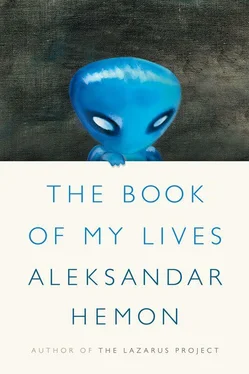* * *
Toward the end of my stay in the fall of ’91, our Irish setter, Mek, kept me company. Still a puppy, he would be up with the birds in the morning and lick my cheeks and forehead, covering them with a thick coating of saliva. I’d let him out to do whatever puppies do at the crack of dawn, while I went back to bed to read, or continue a dream rife with literary characters. One morning, after I’d let him out, the sounds of shooting startled me while I was immersed in a book. When I looked outside, I saw a military police unit, identifiable by their white belts. They were shooting blanks at imaginary enemies, wearing gas masks, charging uphill past the cabin. In their midst was Mek, who in his puppy idiocy was running, prancing, and barking at them. A blank from close range could obviously kill him, so, book in hand, I ran after the charging MP unit in my pajamas, hopelessly summoning Mek to heel. He didn’t heed my calls and I caught up only when the unit stopped for a breather. They took off their gas masks and panted, sweat pouring down their faces, while I incoherently apologized for some perceived fault of mine. They said nothing, too exhausted and invested in their war rehearsal. As I stumbled downhill in my slippers, dragging Mek by the collar, they assumed new combat positions. For all I knew they might have pointed their guns at me.
Another morning, in early December, I sat despondent and cold, drinking tepid tea, too tired to start a fire. Mek placed his head in my lap for petting. I gazed into the bleak fog outside and wondered what would happen to all of us. My mind was so defeated by the unstoppable advance of war that there was no longer a book to read or a story to write that could possibly help it ever recover. At the very moment I reached the deepest recess of despair, the phone rang — or at least that is how my memory has edited that particular scene — and a woman from the American Cultural Center told me that I had been invited to visit the United States for a month under the auspices of the United States Information Agency. I’d had an interview with the head of the Cultural Center earlier that summer, but had expected nothing from it and pretty much forgot all about it. Indeed, I thought for a long moment that it was a prank call of some sort, but when she told me I needed to stop by the center to work out the details of my visit, I promised her I would. I hung up the phone and started building the fire. The following day, I left the mountain.
LET THERE BE WHAT CANNOT BE
On October 14, 1991, Radovan Karadžić spoke at a session of the Bosnian and Herzegovinian Parliament, which had been debating a referendum on independence from the Yugoslavia crippled by the secession of Slovenia and Croatia earlier that year. Karadžić was there to warn the parliament against following the Slovenes and Croats down “the highway of hell and suffering.”
I was in Jahorina at that time, placating myself with reading and writing. I turned on the nightly news to watch him thunder at the frazzled members of the parliament: “Do not think you will not lead Bosnia and Herzegovina into hell and the Muslim people into possible annihilation, as the Muslim people cannot defend themselves in case of war here.” Throughout his tirade, in a manner familiar to me from the press conferences I had attended, he clutched the lectern edges, as though about to hurl it at his feeble audience. But then he let go of it to stab the air with his forefinger at the word annihilation . The Bosnian president, Alija Izetbegović, a Muslim, was visibly distressed.
You can easily find a grainy YouTube clip of Karadžić’s ranting. The Internet and television can convert just about anything into benign banality, but his performance is still bloodcurdling. Karadžić was then president of the hard-line nationalist Serbian Democratic Party, which had already acquired control of the parts of Bosnia with a Serbian majority, but he was not a member of the parliament, nor did he hold any elective office. He was there simply because he could. His very presence rendered the parliament weak and unimportant; backed by the Serb-dominated Yugoslav People’s Army, he spoke from the position of unimpeachable power over the life and death of the people the parliament represented. And he knew it and liked it.
Tranquilized by the weeks of therapeutic reading (Kafka, Mann), I could not initially comprehend what Karadžić meant by “annihilation.” I groped for a milder, less terrifying interpretation — perhaps he meant “historical irrelevance”? I could settle for historical irrelevance, whatever it meant. What he was saying was well outside the scope of my humanist imagination, prone to reveries and fears; his words extended far beyond the habits of normalcy I desperately clung to as war loomed over what Sarajevans called “common life.”
The parliament eventually decided a referendum was the way to go. It took place in February 1992; the Serbs boycotted it while the majority of Bosnians voted for independence. Throughout March, there were barricades on the streets of Sarajevo, much shooting in the mountains around it. In April, Karadžić’s snipers aimed at a peaceful antiwar demonstration in front of the parliament building, and two women were killed. On May 2, Sarajevo was cut off from the rest of the world and the longest siege in modern history began. By the end of the summer, nearly every front page in the universe had published a picture from a Serbian death camp. By that time, I understood that Karadžić had wagged the stick of genocide at the Bosnian Muslims in his address to the hapless Bosnian Parliament, while the unappetizing carrot was their bare survival. “Don’t make me do it,” he was essentially saying. “For I will be perfectly at home in the hell I create for you.”
Now I have little doubt that, regardless of the outcome of the parliamentary session, Karadžić would have gladly sped in his motorcade down the hell-and-suffering highway. What I didn’t see then is clear to me now: the possibility of war not happening was already completely foreclosed. The annihilation machine was happily revving, everything was in place for the genocide operations, the purpose of which was not only the destruction and displacement of Bosnian Muslims but also the unification of the ethnically pure lands into a Greater Serbia. Why had he staged that performance before the parliament, since peace was never an option? Why did he bother?
I have spent time trying to comprehend how everything I had known and loved came violently apart; I have been busy obsessively parsing the details of the catastrophe to understand how it could have taken place. After Karadžić’s arrest, I watched the YouTube clip, trying to figure out why he had bothered. Now I know: the point of that performance was the performance itself. It was not meant for the beleaguered Bosnian Parliament but for the patriotic Serbs watching the broadcast, for those ready to embark upon an epic project that would take sacrifice, murder, and ethnic cleansing to be completed. Karadžić was showing his people that he was as tough and determined a leader as need be, yet neither unwise nor unreasonable. He was indicating that war would not be a rash decision on his part, while capable of recognizing that genocide might be inescapable. If there was a difficult job to be done, he was going to do it unflinchingly and ruthlessly. He was the leader who was going to lead his people through the hell of murder to the land where honor and salvation awaited them.
The model for Karadžić’s role was provided by Petar Petrović Njegoš’s epic poem The Mountain Wreath ( Gorski vijenac ). Just like everyone else, I was forced to study it in school as it was part of the socialist cannon, easy to interpret within the framework of “freedom,” widely available in Tito’s Yugoslavia. Set at the end of the seventeenth century and published in 1847, it is deeply embedded in the tradition of Serbian epic poetry; a foundational text of Serbian cultural nationalism, it always bored me to tears. Its central character is Vladika Danilo, the bishop and sovereign of Montenegro, the only Serbian territory unconquered at the time by the powerful and all-encroaching Ottoman Empire. Vladika Danilo thinks he has a major problem: some Montenegrin Serbs have converted to Islam. For him, they are the fifth column of the Turks, a people who could never be trusted, a permanent threat to the freedom and sovereignty of the Serbian people.
Читать дальше












